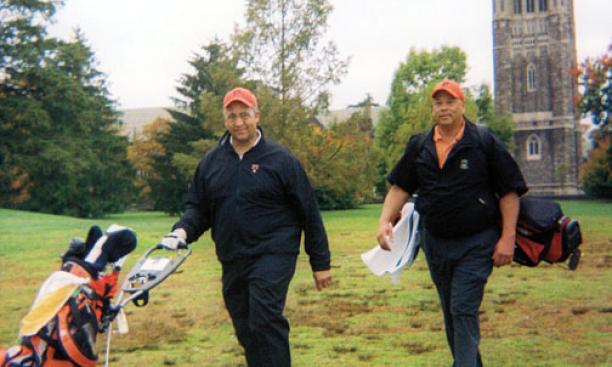

Not even a rainy day last fall at Springdale Country Club — with thunder and a threat of lightning — could slow down the two Princeton alumni on the first tee. Long gone were the wooden Wilson Staff drivers, aviator sunglasses, and Afros they sported in their first rounds at Springdale. They wore rain gear, matching caps, and Princeton shirts that were, well, a little snug.
Rick Hyde ’75 and Burton Smith ’77, black golfers who broke the Ivy League’s color barrier more than 30 years ago, were just two guys playing the game they love. They’d returned to campus for the “Coming Back and Moving Forward” conference for black alumni in October.
“There’s a special link that Rick and I share,” Smith says. “There weren’t that many golfers playing college golf that were of African descent in the 1970s.”
At Princeton, Hyde and Smith combined to earn three varsity letters, and Smith competed in the 1977 Ivy League Championship.
“To come back and put on your Princeton attire 30 years later — it’s rejuvenating,” says Hyde, the first African-American to play golf in the Ivies. “It’s wonderful to belong. It’s a sense of family, and I thought about coach [Bill] Quackenbush.”
Princeton golf was a new world for Hyde back in 1972. The team played spring matches in snowy conditions, and Hyde, a Washington, D.C., native, barely could grip the club in the cold weather.
“One morning there was supposed to be a match over at Springdale. I got up and it was snowing and freezing rain! Snow accumulation on the ground ... mush stuff,” Hyde recalls with a chuckle. “I remember rolling over and going back to sleep.”
But at Springdale, matches were under way.
“I missed the match. It was embarrassing. Coach Quackenbush was pissed!” Hyde says, laughing more. “But I can’t play when my hands are cold!”
Quackenbush faced a greater challenge than the weather. He had to get Hyde on to courses like The Country Club at Brookline, Mass., Pine Valley, and Winged Foot — private clubs that at the time had no black members.
“I think [Quackenbush] was like, ‘Look, the guy can play, the guy’s gonna play. He’s on my team,’” says Hyde, who became an entertainment lawyer after graduation. “He didn’t give a damn.”
Not far behind was Smith — a determined walk-on from Lansing, Mich.
“Rick mentored me and said, ‘No matter what happens, don’t give up,’ and I took that to heart. I have to give him a lot of credit for that,” Smith says. “He said it was important to keep playing, and the coach would play the best players.”
By his junior year in 1976, Smith got his chance. His first match was the H-Y-P match at Yale. He fired a 76 and was the medalist for Princeton. The 1976 Power Bilt irons he used that day are stored in his Michigan basement.
“I still look at that set of clubs,” says Smith, now a transportation and traffic standards engineer in Michigan. “There were moments between those 18 holes that will always be with me for the rest of my life.”
At Springdale, Smith and Hyde reminisced about the scene at the old clubhouse, where the stairs doubled as a grandstand. Teammates would gather to watch tee shots on the first hole, and Quackenbush would stand “stoically in command of everything,” Hyde says.
On a day filled with friendly joshing, saturated greens, and even a few pars, the weather warning horn brought the round to an end on the ninth hole. Hyde and Smith were the only two golfers at Springdale still playing.
Allison Bourne-Vanneck is a freelance writer and a reporter for CBS News 2 in the Virgin Islands.
